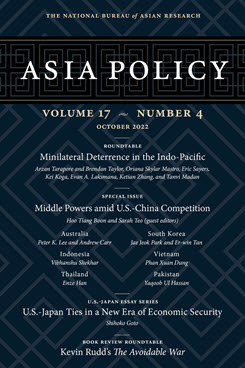Essay in Asia Policy 17.4
Recasting U.S.-Japan Ties in a New Era of Economic Security
This essay examines the evolution of U.S.-Japan economic relations from competition for global markets to cooperation in staving off the threats confronting the rules-based economic order by focusing on the challenges both countries face from China’s weaponization of economic dominance.
Note: This is the third in a series of four Asia Policy essays in 2022–23 on “A U.S.-Japan Partnership for a New Era,” made possible by the generous support of the U.S.-Japan Foundation.
EXECUTIVE SUMMARY
MAIN ARGUMENT
Once the biggest thorn to bilateral relations, trade is no longer the obstacle between Japan and the U.S. that it once was. Instead, shared economic interests not only are bringing Tokyo and Washington together more closely but the two countries are leading the way to coordinate efforts to protect the rules-based liberal economic order and stave off economic coercion from China. But Japan and the U.S. need the support of other countries in Asia, Europe, and beyond to develop an economic security framework that protects the critical technologies of this new economic era and prevents abuse of economic influence. Tokyo’s ability to reach across the Indo-Pacific and establish trust in building an economic architecture with new rules of engagement is leading to more equalized relations between Japan and the U.S. and a larger voice for Japan in regional affairs.
POLICY IMPLICATIONS
- A baseline understanding between Japan and the U.S. regarding what constitutes economic security and what the threats are to protecting growth has been made clear. A slew of bilateral and multilateral initiatives has ensued as a result, but there is significant overlap among them. If the partnerships are to be effective, efforts should be consolidated and streamlined.
- Japan’s more realist approach to dealing with the China challenge, whereby values-based diplomacy does not supersede efforts to focus on common interests and shared challenges, resonates in the Indo-Pacific. If the U.S. continues to look to Japan’s political and economic leadership, the prospects for engaging more successfully with Southeast Asian states will improve.
- Protecting technologies and cooperation in technology innovation is vital for defense purposes as well as for economic expansion. At the same time, the global economy continues to face significant challenges from the disruptions caused by the Covid-19 pandemic and rising geopolitical risks. A focus on conventional economic concerns, including growth prospects and market access, cannot be sidelined if there is to be effective cooperation between industrialized nations and the global South.
Shihoko Goto is the Director for Geoeconomics and Indo-Pacific Enterprise and Deputy Director for the Asia Program at the Wilson Center (United States). Her research focuses on the economics and politics of Japan, Taiwan, and South Korea, as well as U.S. policy in Northeast Asia. A seasoned journalist and analyst, she has reported from Tokyo and Washington for Dow Jones and United Press International on the global economy, international trade, and Asian markets. Previously, she was a donor country relations officer for the World Bank. Ms. Goto has written for the Diplomat magazine and is a contributing editor to the Globalist. She has been awarded fellowships from the East-West Center and the Knight Foundation, among others.
About Asia Policy
Asia Policy is a peer-reviewed scholarly journal presenting policy-relevant academic research on the Asia-Pacific that draws clear and concise conclusions useful to today’s policymakers. Asia Policy is published quarterly in January, April, July, and October and accepts submissions on a rolling basis. Learn more


